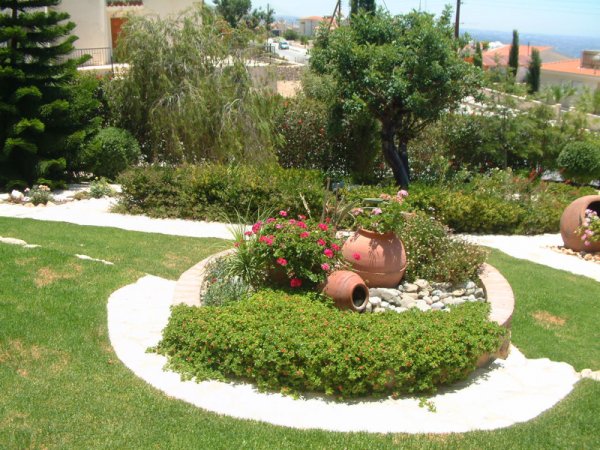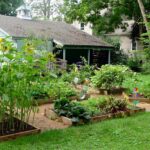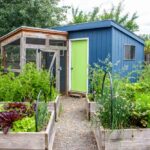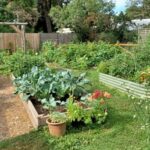Welcome to the world of herb gardens on a 15-acre homestead, where sustainability meets tranquility. As homestead dreamers, many of us envision a life where we grow our own food, enjoy the fruits of our labor, and reconnect with nature. A herb garden is an essential part of this lifestyle, offering both culinary delights and natural remedies.
On a 15-acre homestead, the possibilities for cultivating a diverse and bountiful herb garden are endless. Whether you’re a seasoned gardener or a novice, this guide will help you navigate the rewarding journey of creating your own herb garden paradise.

Why Choose a Herb Garden?
A herb garden is more than just a collection of plants. It’s a resource for fresh ingredients, a means of connecting with nature, and a way to make your homestead more self-sufficient. Herbs offer numerous benefits, from enhancing your cooking to providing natural remedies for common ailments. Additionally, they attract beneficial insects and pollinators, which are crucial for the health of your entire homestead ecosystem.
Planning Your Herb Garden
Choosing the Right Location
The first step in planning your herb garden is selecting the perfect location. Herbs thrive in sunny spots, so choose an area that receives at least six hours of sunlight per day. The soil should be well-draining and rich in organic matter. If your soil is heavy clay or sandy, consider amending it with compost or building raised beds.
Designing Your Garden Layout
When designing your herb garden layout, consider both aesthetics and functionality. Arrange herbs according to their height, with taller plants in the back and shorter ones in the front. Group herbs with similar growing requirements together to simplify maintenance. Paths or stepping stones can help you navigate the garden and make maintenance easier.
Essential Herbs for Your Homestead
Common Culinary Herbs
Some must-have culinary herbs for your homestead include basil, rosemary, thyme, and parsley. These herbs are versatile in the kitchen and can be used fresh or dried. They add flavor and aroma to a wide range of dishes, from soups and stews to sauces and marinades.
Medicinal Herbs
In addition to culinary herbs, consider growing medicinal herbs such as chamomile, Echinacea, and peppermint. These herbs can be used to make teas, tinctures, and salves that support health and well-being. Always research the proper use of medicinal herbs and consult with a healthcare professional if needed.
Caring for Your Herb Garden
Watering and Fertilizing
Herbs generally require moderate watering. It’s best to water deeply but infrequently, allowing the soil to dry out slightly between waterings. Overwatering can lead to root rot, so ensure your garden has good drainage. Fertilize your herbs with a balanced organic fertilizer during the growing season to promote healthy growth.
Pest Management
While herbs are relatively pest-resistant, some common garden pests may still pose a threat. Integrated pest management techniques, such as encouraging beneficial insects and using natural repellents, can help protect your herb garden. For more details on integrated pest management, visit our dedicated page.
Harvesting and Preserving Herbs
When to Harvest
The best time to harvest herbs is in the morning after the dew has dried but before the sun’s heat can evaporate the essential oils. Harvest regularly to encourage new growth and prevent the plants from becoming woody.
Preservation Techniques
To enjoy your herbs year-round, consider drying, freezing, or making herb-infused oils and vinegars. These preservation methods capture the flavors and aromas of fresh herbs, allowing you to savor them long after the growing season has ended.

FAQs About Herb Gardens on 15 Acre Homestead
What herbs are best for beginners?
Beginner-friendly herbs include basil, parsley, chives, and mint. These herbs are easy to grow and require minimal maintenance.
How can I keep pests away from my herb garden?
Encourage beneficial insects like ladybugs and use natural repellents such as neem oil. For more tips, explore our page on pest management.
Can I grow herbs indoors?
Yes, many herbs can be grown indoors. Ensure they receive enough sunlight and proper drainage. Consider using grow lights during the winter months.
Creating a herb garden on a 15-acre homestead is a rewarding endeavor that enhances your self-sufficiency and enriches your lifestyle. With careful planning and maintenance, your herb garden will flourish, providing you with fresh flavors and natural remedies for years to come. For more insights into homesteading, check out this introduction to modern homesteading.




